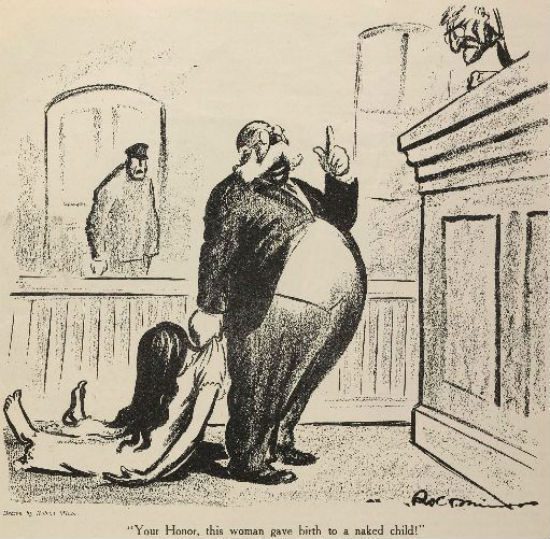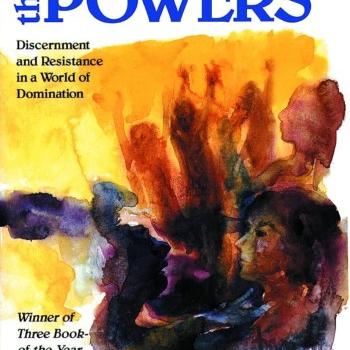So yesterday we discussed “What ‘SJW’ really means.” In that discussion we entertained — and rejected — the possibility that this is merely a satirical bit of irony employed to deflate pompous moralizers. Today we will, again, entertain and reject that possibility — based solely on the empirical fact that this is not how the term is used. Ever. Not at all.
Seriously, I appreciate the numerous thoughtful attempts to attribute some larger, more sophisticated meaning to the term. I agree that many of the things that those trying to defend this phrase say this hypothetical, more nuanced denotation is meant to attack are, indeed, worthy of criticism. But I also have wifi. I’ve seen the Internet. (I’m on it right now!) And so I know that this refined hypothetical alternative theory about what the term might possibly mean is not in evidence there.
We have Google. Facebook and Twitter have semi-useful search functions. The comments sections on YouTube and local newspaper sites are not hidden behind a paywall. We can all see and read how this term is actually used, and when, and why.
And that use — in the overwhelming majority of instances — has nothing to do with the imaginary usage described by the term’s defenders.
Those defenders also aren’t helping their case any by pretending that the actual, documented use we can all plainly see doesn’t even exist. It would still be inaccurate nonsense if they claimed, “Well, yes, that may be how some small number of gamer-gaters or sad puppies or Pepe-icon alt-Nazis are using the term, but that’s not it’s primary meaning. …” But to pretend that this usage — the vastly larger share of all use of the term — doesn’t even exist, or doesn’t matter for those attempting to use it in some very different way, is just silly.
Yes, if we transported ourselves back in time to some point at which the term “SJW” had never been employed as an insult, then we could imagine this as a possible, or even a likely, meaning. “Social justice warrior,” extracted from usage and context, might indeed sound like an ironic criticism of Comstockian blowhards — a pinprick meant to let the gas out of Cotton Mather types, sanctimonious moralists, and witch-sniffers of every stripe seeking to police the thoughts and lives of others.
But we are not back in time and the term does not exist apart from the way it is used. And the context of that use in 99 percent of all cases, isn’t anything like that hypothetical meaning. This — from the comments yesterday — is a polite, articulate bit of utter folderol:
Social Justice Warrior is a lot like the insult ‘moral crusader’, an asshole who goes on self righteous crusades in the name of ‘social justice’/’morality’ as THEY see it. See social justice is a vague term and not everyone will agree on what exactly constitutes social justice (and I mean down to the nitty gritty specifics).
… Ask anyone who actually uses SJW and they won’t say Social Justice is inherently a bad thing (depending on how you define it). People who use the pejorative moral crusader don’t think morality is a bad thing either.
No.
I have, in fact, asked many people who employ this term if that is what they mean by it. I have patiently and clearly inquired if what they mean by this is that “SJWs” are merely so-called social justice warriors, and if the insult is intended to mock them as being either insufficiently committed to social justice or as advocating a vision of social justice that would be, in fact, unjust.
Not one of them would accept a repeated invitation to affirm that “social justice,” when properly defined and understood, is a worthy good. It didn’t matter how many ways I stated that we remain free to dispute the specific particularities of what we mean by social justice, not one of them would affirm that social justice “depending on how you define it” was inherently good.
The more-sophisticated-than-thou rebels against the strait-jacket of oppressive social justice — i.e., those defending this imaginary satirical meaning of the term here in comments — are the first to respond by saying that they don’t oppose justice per se, only certain (implicit, but not explicitly defined) misconceptions of it. And it took me 2,000 words to drag that out of them.
The comment above is notable for its willingness to concede that some form of something that might be referred to as “social justice” might not be all bad. But we only arrive there with multiple qualifications and after the initial obfuscation of “social justice is a vague term.”
Uh-huh.
First — and this is important — it’s the anti-SJW folks who introduce the term “social justice” to the conversation. Whatever the merits or demerits of that term, whatever vagueness, whatever multitude of granular disputes it may encompass, those were introduced by those using “SJW” as an insult. They’re not responding to people saying “Social justice, yay!” They’re responding to people who are addressing specific, contextual instances of actual injustice. Usually, those condemned as “SJWs” were speaking up against specific, actual examples of racism or sexism. These “SJWs” weren’t announcing the launch of a grand moral crusade to impose their top-down utopian planned society. In the vast majority of cases, they haven’t said anything about justice at all. In most cases — millions of them, all over the Internet — these people were denigrated as SJWs because they said something like “Knock it off with the cat-calling and street harassment” or “Black lives matter.”
The ones making the leap from the specific to the vaguely abstract are the ones saying “SJW” as an insult. “Social justice” is, in this context, their term. (Or — based on their attempted defenses of the term in comments to the previous post — it’s the term that the cruel “PC” humanities professor in their heads was using, and they’ve simply forgotten that the rest of us can’t hear her.) It won’t do to pretend that you’re just satirically asking what the SJW means when they say “social justice,” because they didn’t say it. You did.
But also, secondly, no, justice is not vague. Justice ain’t complicated. “Do justice,” the prophet Micah said, without any need to expound on that with a treatise on what it might entail. Life is complicated, and thus the requirements of justice can be difficult to discern in complex, morally ambivalent circumstances. Discussing the complications of the requirements of justice in complex situations can be fascinating — at least, if you’re the sort of person who enjoys endless variations of the Trolley Problem.
But the overriding aim of such discussions and arguments is not about the vagueness of justice. Justice is the not-at-all-complicated standard by which all such arguments are determined. The disagreements are not over “what it justice? It’s so hard to know!” but over what actions and choices, policies, laws, behaviors, etc., are more or less just in any given circumstances.
Some people are interested in such discussions. Others seek to prevent them from ever happening by bullying those “SJWs” into silence.
Again, we can see how the word is used. We can see what is said when it is used and we can see what is never said. It’s not an expression of frustration over the supposed SJWs refusal to hear some alternative suggestion for correcting the injustices of racism or sexism. It is, rather, a mockery of the idea that racism and sexism are forms of injustice that need to be corrected.
The people deploying this insult aren’t Jack Kemp types, or even Shelby Steele types. They’re not people promoting contrarian, unorthodox approaches that they believe would better achieve justice. That’s not what they’re saying. The rigid orthodoxy they’re challenging is the idea that racism and sexism are injustices at all.
So let’s come back down out of the ether and step back from the awkward abstractions introduced by the attempt to change the subject from specific instances of injustice to the more grandiose “social justice.” Let’s consider who this epithet is directed toward, and who it is not.

“SJW” isn’t deployed against the religious right. It isn’t deployed against the Comstocks and Mathers and Falwells and Carrie Nations, or against the Abubakar Shekaus and Mohammed Omars.
It isn’t employed to take our modern-day Comstocks down a peg. It imitates Comstock more than it ridicules him — updating his efforts to keep women in their place. “SJW” isn’t employed to ridicule pompous moralizers and mini-ayatollahs who trample on the underdogs. It is employed to ridicule anyone who stands up, stands with, or stands among the underdogs. And it is employed by people who resent that others refuse to see them as the real, true underdogs.
Again, the Internet is public. We can read it. And when we do, we can clearly see that the term “SJW” is employed — specifically and predictably, inevitably and ceaselessly — against people who speak up about racism and sexism.
Take away the instances where the term “SJW” is used to bully those critical of racism and sexism and the term disappears almost entirely. It means that. It means that to such an extent that it cannot mean anything else.
The overwhelming majority of “moral crusaders” targeted with this supposedly satiric deflation of the self-righteous are those who say anything critical in response to instance of racism and sexism. I’m sure we can find numerous instances in which people speaking up against racism and sexism were also self-righteous in doing so — self-righteousness is a universal human trait. And I’m sure we can find some real-world analogues to that cruel humanities professor apparently belittling you in your head. But the intense hostility directed at such self-righteous opponents of racism or sexism is not directed mainly at that self-righteousness, but at the substance of their claim — at the idea that racism and sexism are unjust.
And in any case, we have seen the insult deployed — millions of times over — against people who have spoken out against racism and sexism without even the slightest hint of a “moral crusader’s” self-righteousness. Their criticism of racism and sexism may be as utterly understated as “Hey, that’s not cool” or “C’mon, you don’t want to turn into that guy,” and they will still be subjected to the scornful label “SJW.” The sentiment expressed might even be the mildest, most non-controversially minimalist, non-threatening statement imaginable — “black lives matter” — and still the response is “SJW.”
This is how the word is used. If not in every recorded instance in human history, in the huge majority of cases. To claim otherwise is bullshit. To claim otherwise online — where those words can only be read by other people who are also online and who therefore have seen the online world — is audaciously dishonest.
The only way to salvage any good-faith credibility out of this attempted defense of the term is to allow its defenders to make a limited, individual, personal claim. We can extend a monumental benefit of the doubt to allow them to say, “Well, I personally have somehow managed to be blissfully unaware of the way this term is employed most of the time by others, and I hadn’t noticed the vast sea of such usage all around us on the Internet. But I, personally, did not intend the word to mean any of that. I, personally, meant it differently. I, personally, meant it exclusively as a term for deflating pompous moral crusaders who go on ‘self righteous crusades in the name of social justice/morality as THEY see it.'”
But for that possibility to be at all believable, we need to ask: What do you mean by “morality as THEY see it”?
Clearly what that means is that you find the purported morality of these “moral crusaders” to be illegitimate — to involve moral claims that are false, unfair, unjust, untrue. What, specifically, are those illegitimate claims?
And before you answer, keep in mind that the overwhelming majority of those who employ the term “SJW” have communicated, with unmistakable clarity, precisely which moral claims they reject as illegitimate. They reject the claim that racism is unjust as nothing more than some crusading hypocrite trying to impose “morality as THEY see it” onto others — others who ought to be free to express and demonstrate racism without any such moral criticism. They reject the claim that sexism is unjust as nothing more than some crusading hypocrite trying to impose “morality as THEY see it” onto others — others who ought to be free to express and demonstrate sexism without any such moral criticism.
That’s what nearly everybody else using this term means. So if that’s not what you mean, then please say so. Please say, “Racism is unjust.” Please say, “Sexism is unjust.”
Because I have to tell you, I’ve asked many others who use this term if they were willing to say those things. And not one of them was.*
If you are willing and able to say those things — if you actually believe them — then I’d implore you to also consider this: You need to stop saying “SJW” to mean what you mean by it, because those others using it differently outnumber you and they’re louder than you are. Their very different, explicitly deplorable meaning overshadows yours and prevents you, and anyone else, from communicating what you’re trying to say using this term.
If you only and innocently mean “moral crusader,” then say “moral crusader.” If you mean “self-righteous blowhard” then say “self-righteous blowhard.” Feel free to borrow any of the many phrases I use for that above. Feel free to invent a new one of your own. Feel free to direct any of those phrases my way.
But you’re not communicating any of that if you say “SJW.” That won’t communicate the idea that you’re mocking someone for being self-righteous. It just makes everyone else reasonably conclude, based on the available evidence, that you’re a gamer-gater, 32-chan, MRA, sad-puppy, white-supremacist. Or, at best, that you’re someone who doesn’t have any quarrel with such folks and their ideology.
– – – – – – – – – – – –
* None would say this, that is, without immediately qualifying the statement in a way that perverted it beyond all recognition. Saying, for example, “Racism is unjust. But it’s not racism to defend white rights, and those people are the real racists, because …” Or saying, “Sexism is unjust. But it’s not sexism to point out that men are stronger and smarter and ordained by God to lead …”
In other words, they would not — could not — say it and mean it. Not one of them. I’ll keep looking and keep trying, but if I manage to encounter a few counter-examples, that doesn’t put a dent in the overwhelming conclusion of the overwhelming evidence. The word means what it is used to mean. It does not mean what it is never or almost-never used to mean. That’s how words work.












